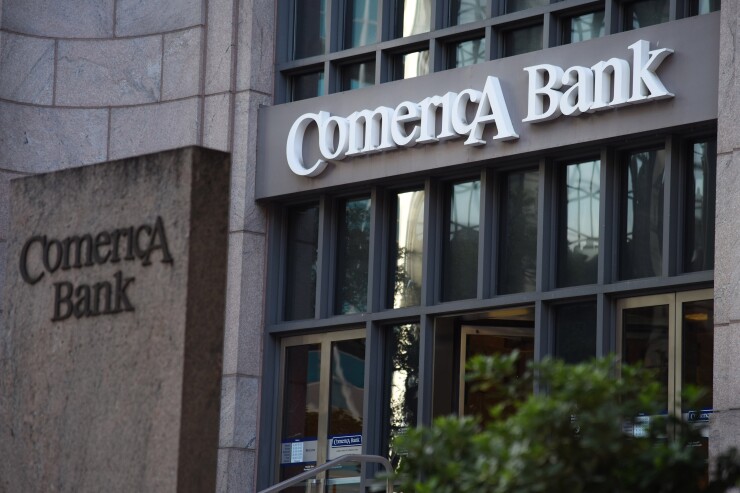Comerica saw deposit levels decline rapidly last month as startups that were spooked by last month's tumult diversified where they stored cash.
The Dallas-based bank said that $3.7 billion in deposits, primarily from the corporate, life sciences and technology, and California-based middle market sectors, was withdrawn in the three weeks following the run and failure of Silicon Valley Bank.
Regional banks across the country have lost deposits recently, as people look for higher-yielding places to store their money in a rising interest rate and high inflation environment. Comerica was anticipating a decline in deposits before the banking crisis, but the increased prioritization among business clients to keep bank balances under $250,000 pushed more cash out of the bank.
The $91.2 billion-asset bank updated its deposit expectations, forecasting a fall of 12% to 14% this year. In early March, Comerica said it anticipated a decline between 9% and 10% for the year.
Peter Sefzik, long-time chief banking officer, said on the bank's earnings call that despite total deposits declining, Comerica hasn't lost customers. The bank actually added accounts following SVB's collapse. He added that he thinks some of that money will return down the line, though the bank isn't relying on that in its outlook.
"We believe there is a level of deposits that would flow back," Sefzik said on the call. "We continue to believe that we provide a better customer relationship, better service than other banks. It's not unusual for people to come back to us because they don't get the service that they wanted at another institution."
Before the pandemic, Comerica had $57 billion in deposits, which peaked at $82 billion during the pandemic as stimulus checks and low rates flooded the sector. Brian Foran, an analyst at Autonomous Research, said that as the bank's deposits dropped to $64.7 billion, the pandemic was "a liquidity fever dream and they've done almost a full round trip."
Kevin Heal, an analyst at Argus Research, said in an interview that he thinks Comerica will pick up enough customers in the future to eventually offset the drop in deposits. He added that he thought the Dallas-based bank is in the "upper echelon" of regional banks.
"Banks that maintain capital levels, have a robust hedging program and are maintaining their concentration risk on the commercial side, those regional banks will be able to thrive in the long run," Heal said.
The drop in deposits took a toll on Comerica's net interest income, which dropped to $708 million, from $742 million the previous quarter. The company updated its net interest income guidance from 17% to 20% growth for the year to 6% to 7%.
The outlook Comerica shared this morning, which was more downbeat than its previous outlook, led to a decline in its stock price this morning. Nevertheless, the price rose steadily throughout the day, closing at $45.81 per share. Morningstar analyst Eric Compton wrote in a note that he thinks the bank's shares are "significantly undervalued," estimating a fair value of $79 per share.
CEO Curt Farmer said on the call that he thought Comerica has emerged from the recent turbulence in the sector in a "strong position."
"We remain focused on business as usual, winning new opportunities, attracting talent, underwriting credit, and expanding relationships," Farmer said on the call. "We believe our strong deposit franchise is now even more attractive and stable, with a lower percentage of uninsured excess deposits and less concentration with price-sensitive customers."






